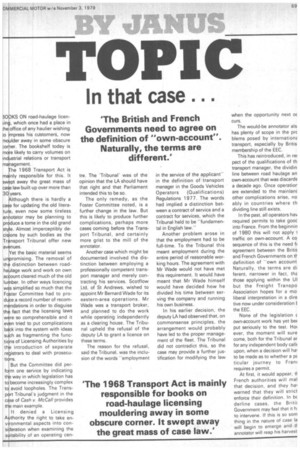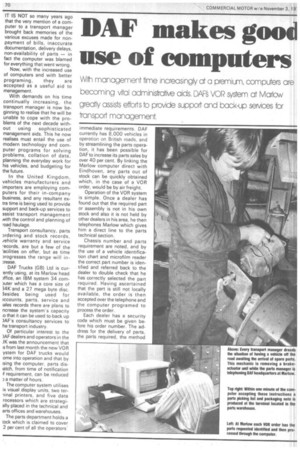TOP! C
Page 71

Page 72

If you've noticed an error in this article please click here to report it so we can fix it.
In that case •
'The British and French Governments need to agree on the definition of "own-account". Naturally, the terms are different.'
30 KS ON road-haulage licen;in , which once had a place in the office of any haulier wishing to mpress his customers, now moulder away in some obscure .7.orner. The bookshelf today is moke likely to carry volumes on indlustrial relations or transport management.
The 1968 Transport Act is m nly responsible for this. It pt away the great mass of ca law built up over more than 30 years.
although there is hardly a ca -e for updating the old literatu , even now some tireless an otator may be planning to pri duce a tome in the old grand St e. Almost imperceptibly deci ons by such bodies as the Tr nsport Tribunal offer new av nues.
et the basic material seems
u romising. The removal 'of th distinction between roadha lage work and work on own account cleared much of the old luqnber. In other ways licencing was simplified so much that the Foster Committee had to prod ce a record number of recomm ndations in order to disguise th fact that the licensing laws w re so comprehensible and it n tried to put complications b k into the system with ideas s h as fragmenting the functi ns of Licensing Authorities by t introduction of separate re istrars to deal with prosecuti ns.
But the Committee did perfo m one service by indicating t way in which legislation has t become increasingly complex to avoid loopholes. The Transport Tribunal's judgment in the case of Cash v. McCall provides the main example.
It denied a Licensing Authority the right to take environmental aspects into consderation when examining the suitability of an operating cen
tre. The 'Tribunal' was of the opinion that the LA should have that right and that Parliament intended this to be so.
The only remedy, as the Foster Committee noted, is a further change in the law. But this is likely to produce further complications, perhaps more cases coming before the Transport Tribunal, and certainly more grist to the mill of the annotator.
Another case which might be documented involved the distinction between employing a professionally competent transport manager and merely contracting his services. Scotflow Ltd, of St Andrews, wished to appoint Mr Bernard Wade for its eastern-area operations. Mr Wade was a transport broker, and planned to do the work while operating independently as a clearing house. The Tribunal upheld the refusal of the deputy LA to grant a licence on these terms.
The reason for the refusal, said the Tribunal, was the inclusion of the words "employment in the service of the applicantin the definition of transport manager in the Goods Vehicles Operators (Qualifications) Regulations 1977. The words had implied a distinction between a contract of service and a contract for services, which the Tribunal held to be -fundamental in English law.
Another problem arose in that the employment had to be full-time, To the Tribunal this meant employment during the entire period of reasonable working hours. The agreement with Mr Wade would not have met this requirement. It would have meant that Mr Wade himself would have decided how he divided his time between serving the company and running his own business.
In his earlier decision, the deputy LA had observed that, on commonsense principles, the arrangement would probably have led to the proper management of the fleet. The Tribunal did not contradict this, so the case may provide a further justification for modifying the law
when the opportunity next oc curs.
The would-be annotator ala has plenty of scope in the prc blems posed by internationE transport, especially by Britis membership of the EEC.
This has reintroduced, in re pect of the qualifications of th transport manager, the dividin line between road haulage an own-account that was discardE a decade ago. Once operatior are extended to the mainlanc other complications arise, no ably in countries where th dividing line still exists.
In the past, all operators ha\, required permits to take goor into France. From the beginnin of 1980 this will not apply 1 traffic on own-account. A co sequence of this is the need ft agreement between the Britis and French Governments on definition of "own account Naturally, the terms are di ferent, narrower in fact, thz those applying within the Ul but the Freight Transpo Association hopes for a mo liberal interpretation in a dire tive now under consideration k the EEC.
None of the legislation c own-account work has yet be put seriously to the test. Ho■ ever, the moment will sure come, both for the Tribunal ar for any independent body calk upon, when a decision will has to be made as to whether a pzticular journey to Fran( requires a permit.
At first, it would appear, tl French authorities will mal that decision, and they has warned that they will strict enforce their definition. In bc derline cases, the Britif. Government may feel that it h. to intervene. If this is so som thing in the nature of case la will begin to emerge and ti annotator will reap his harvest
IT IS NOT so many years ago that the very mention of a com puter to a transport Manager brought back memories of the various excuses made for non payment of bills, inaccurate documentation, delivery delays, non-availability of parts — in fact the computer was blamed for everything that went wrong.
Now, with the increased use of computers and with better programing, they are accepted as a useful aid to management.
With demands on his time continually increasing, the transport manager is now be ginning to realise that he will be unable to cope with the pro blems of the next decade with out using sophisticated management aids. This he now realises must entail the use of modern technology and computer programs for solving problems, collation of data, planning the everyday work for his vehicles, and budgeting for the future.
In the United Kingdom, vehicles manufacturers and importers are employing com puters for their in-company business, and any resultant ex tra time is being used to provide support and back-up services to assist transport management ,n/ith the control and planning of road haulage.
Transport consultancy, parts 3rdering and stock records,
/ehicle warranty and service -ecords, are but a few of the Ocilities on offer, but as time 3rogresses the range will in.-Tease.
DAF Trucks (GB) Ltd is curontly using, at its Marlow head Afice, an IBM system 34 corn 3uter which has a core size of 34K and a 27 mega byte disc.
3esides being used for accounts, parts, service and ales records there are plans to ncrease the system's capacity ,o that it can be used to back up )AF's consultancy services to he transport industry.
Of particular interest to the )AF dealers and operators in the JK was the announcement that is from last month the new VOR ystem for DAF trucks would ome into operation and that by Ising the computer, parts disetch, from time of notification f requirement, can be reduced 3a matter of hours.
The computer system utilises ix visual display units, two ter-ainal printers, and five data rocessors which are strategially placed in the technical and arts offices and warehouses. The parts department holds a took which is claimed to cover 2 per cent of all the operators'




























































































































